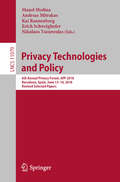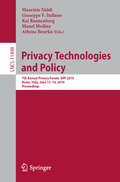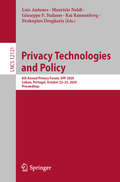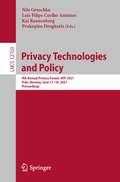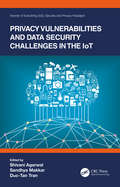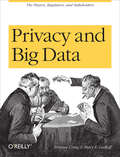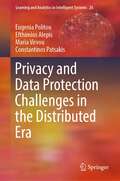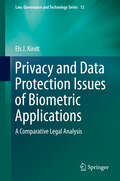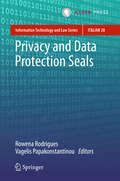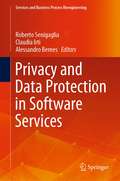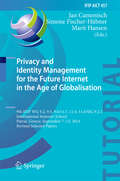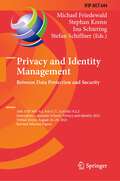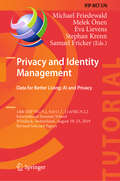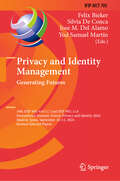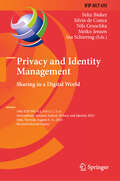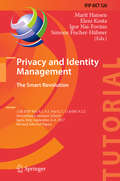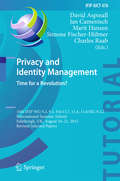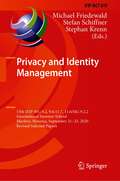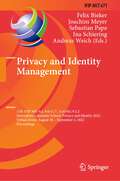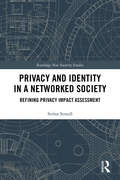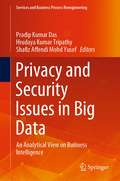- Table View
- List View
Privacy Technologies and Policy: 5th Annual Privacy Forum, APF 2017, Vienna, Austria, June 7-8, 2017. Revised Selected Papers (Lecture Notes in Computer Science #10518)
by Kai Rannenberg Erich Schweighofer Andreas Mitrakas Manel Medina Nikolaos TsouroulasThis book constitutes the thoroughly refereed post-conference proceedings of the 6th Annual Privacy Forum, APF 2018, held in Barcelona, Spain, in June 2018. <P><P>The 11 revised full papers were carefully reviewed and selected from 49 submissions. The papers are grouped in topical sections named: technical analysis and techniques; privacy implementation; compliance; and legal aspects.
Privacy Technologies and Policy: 7th Annual Privacy Forum, APF 2019, Rome, Italy, June 13–14, 2019, Proceedings (Lecture Notes in Computer Science #11498)
by Kai Rannenberg Manel Medina Maurizio Naldi Giuseppe F. Italiano Athena BourkaThis book constitutes the refereed conference proceedings of the 7th Annual Privacy Forum, APF 2019, held in Rome,Italy, in June 2019. The 11 revised full papers were carefully reviewed and selected from 49 submissions. The papers present original work on the themes of data protection and privacy and their repercussions on technology, business, government, law, society, policy and law enforcement bridging the gap between research, business models, and policy. They are organized in topical sections on transparency, users' rights, risk assessment, and applications.
Privacy Technologies and Policy: 8th Annual Privacy Forum, APF 2020, Lisbon, Portugal, October 22–23, 2020, Proceedings (Lecture Notes in Computer Science #12121)
by Kai Rannenberg Maurizio Naldi Giuseppe F. Italiano Luís Antunes Prokopios DrogkarisThis book constitutes the refereed conference proceedings of the 8th Annual Privacy Forum, APF 2020, held in Lisbon, Portugal, in October 2020.The 12 revised full papers were carefully reviewed and selected from 59 submissions. The papers are organized in topical sections on impact assessment; privacy by design; data protection and security; and transparency.
Privacy Technologies and Policy: 9th Annual Privacy Forum, APF 2021, Oslo, Norway, June 17–18, 2021, Proceedings (Lecture Notes in Computer Science #12703)
by Kai Rannenberg Nils Gruschka Prokopios Drogkaris Luís Filipe Coelho AntunesThis book constitutes the refereed conference proceedings of the 9th Annual Privacy Forum, APF 2021. Due to COVID-19 pandemic the conference was held virtually. The 9 revised full papers were carefully reviewed and selected from 43 submissions. The papers are organized in topical sections on Implementing Personal Data Processing Principles; Privacy Enhancing Technologies; Promoting Compliance with the GDPR.
Privacy Vulnerabilities and Data Security Challenges in the IoT (Internet of Everything (IoE))
by Shivani Agarwal, Sandhya Makkar, and Duc-Tan TranThis book discusses the evolution of security and privacy issues in the Internet of Things (IoT). The book focuses on assembling all security- and privacy-related technologies into a single source so that students, researchers, academics, and those in the industry can easily understand the IoT security and privacy issues. This edited book discusses the use of security engineering and privacy-by-design principles to design a secure IoT ecosystem and to implement cyber-security solutions. This book takes the readers on a journey that begins with understanding security issues in IoT-enabled technologies and how these can be applied in various sectors. It walks readers through engaging with security challenges and building a safe infrastructure for IoT devices. The book helps researchers and practitioners understand the security architecture of IoT and the state-of-the-art in IoT countermeasures. It also differentiates security threats in IoT-enabled infrastructure from traditional ad hoc or infrastructural networks, and provides a comprehensive discussion on the security challenges and solutions in RFID and WSNs in IoT. This book aims to highlight the concepts of related technologies and novel findings by researchers through its chapter organization. The primary audience comprises specialists, researchers, graduate students, designers, experts, and engineers undertaking research on security-related issues.
Privacy and Anonymity in Information Management Systems
by Jordi Nin Javier HerranzThe development of information technologies in the last few years has been remarkable. Large amounts of data are collected and stored by both public institutions and private companies every day. There are clear threats to the privacy of citizens if no care is taken when collecting, storing and disseminating data. Ensuring privacy for individuals in a society when dealing with digital information, is a task which involves many agents, including politicians, legal authorities, managers, developers, and system administrators. Privacy and Anonymity in Information Management Systems deals with the more technical parts of this `privacy cycle', those issues that are mostly related to computer science, and discusses the process by which different privacy mechanisms are motivated, designed, analyzed, tested and finally implemented in companies or institutions. The book is written in such a way that several of the chapters are self-contained and accessible to students, covering topics such as the problem of Statistical Disclosure Control (SDC), i.e. how to modify datasets that contain statistical information before publicly releasing them, and doing so in such a way that the privacy of the confidential original information is preserved; and specific distributed applications involving privacy - how different agents have private inputs but want to cooperate to run some protocol in their own interest, without revealing unnecessary parts of their private inputs. Graduate students and researchers will find this book an excellent resource.
Privacy and Big Data: The Players, Regulators, and Stakeholders
by Mary E. Ludloff Terence CraigMuch of what constitutes Big Data is information about us. Through our online activities, we leave an easy-to-follow trail of digital footprints that reveal who we are, what we buy, where we go, and much more. This eye-opening book explores the raging privacy debate over the use of personal data, with one undeniable conclusion: once data's been collected, we have absolutely no control over who uses it or how it is used.Personal data is the hottest commodity on the market today—truly more valuable than gold. We are the asset that every company, industry, non-profit, and government wants. Privacy and Big Data introduces you to the players in the personal data game, and explains the stark differences in how the U.S., Europe, and the rest of the world approach the privacy issue.You'll learn about:Collectors: social networking titans that collect, share, and sell user dataUsers: marketing organizations, government agencies, and many othersData markets: companies that aggregate and sell datasets to anyoneRegulators: governments with one policy for commercial data use, and another for providing security
Privacy and Capitalism in the Age of Social Media (Routledge Research in Information Technology and Society #18)
by Sebastian SevignaniThis book explores commodification processes of personal data and provides a critical framing of the ongoing debate of privacy in the Internet age, using the example of social media and referring to interviews with users. It advocates and expands upon two main theses: First, people’s privacy is structurally invaded in contemporary informational capitalism. Second, the best response to this problem is not accomplished by invoking the privacy framework as it stands, because it is itself part of the problematic nexus that it struggles against. Informational capitalism poses weighty problems for making the Internet a truly social medium, and aspiring to sustainable privacy simultaneously means to struggle against alienation and exploitation. In the last instance, this means opposing the capitalist form of association – online and offline.
Privacy and Data Protection Challenges in the Distributed Era (Learning and Analytics in Intelligent Systems #26)
by Maria Virvou Efthimios Alepis Eugenia Politou Constantinos PatsakisThis book examines the conflicts arising from the implementation of privacy principles enshrined in the GDPR, and most particularly of the ``Right to be Forgotten'', on a wide range of contemporary organizational processes, business practices, and emerging computing platforms and decentralized technologies. Among others, we study two ground-breaking innovations of our distributed era: the ubiquitous mobile computing and the decentralized p2p networks such as the blockchain and the IPFS, and we explore their risks to privacy in relation to the principles stipulated by the GDPR. In that context, we identify major inconsistencies between these state-of-the-art technologies with the GDPR and we propose efficient solutions to mitigate their conflicts while safeguarding the privacy and data protection rights. Last but not least, we analyse the security and privacy challenges arising from the COVID-19 pandemic during which digital technologies are extensively utilized to surveil people’s lives.
Privacy and Data Protection Issues of Biometric Applications
by Els J. KindtThis book discusses all critical privacy and data protection aspects of biometric systems from a legal perspective. It contains a systematic and complete analysis of the many issues raised by these systems based on examples worldwide and provides several recommendations for a transnational regulatory framework. An appropriate legal framework is in most countries not yet in place. Biometric systems use facial images, fingerprints, iris and/or voice in an automated way to identify or to verify (identity) claims of persons. The treatise which has an interdisciplinary approach starts with explaining the functioning of biometric systems in general terms for non-specialists. It continues with a description of the legal nature of biometric data and makes a comparison with DNA and biological material and the regulation thereof. After describing the risks, the work further reviews the opinions of data protection authorities in relation to biometric systems and current and future (EU) law. A detailed legal comparative analysis is made of the situation in Belgium, France and the Netherlands. The author concludes with an evaluation of the proportionality principle and the application of data protection law to biometric data processing operations, mainly in the private sector. Pleading for more safeguards in legislation, the author makes several suggestions for a regulatory framework aiming at reducing the risks of biometric systems. They include limitations to the collection and storage of biometric data as well as technical measures, which could influence the proportionality of the processing. The text is supported by several figures and tables providing a summary of particular points of the discussion. The book also uses the 2012 biometric vocabulary adopted by ISO and contains an extensive bibliography and literature sources.
Privacy and Data Protection Seals (Information Technology and Law Series #28)
by Vagelis Papakonstantinou Rowena RodriguesThe book presents timely and needed contributions on privacy and data protection seals as seen from general, legal, policy, economic, technological, and societal perspectives. It covers data protection certification in the EU (i.e., the possibilities, actors and building blocks); the Schleswig-Holstein Data Protection Seal; the French Privacy Seal Scheme; privacy seals in the USA, Europe, Japan, Canada, India and Australia; controversies, challenges and lessons for privacy seals; the potential for privacy seals in emerging technologies; and an economic analysis. This book is particularly relevant in the EU context, given the General Data Protection Regulation (GDPR) impetus to data protection certification mechanisms and the dedication of specific provisions to certification. Its coverage of practices in jurisdictions outside the EU also makes it relevant globally. This book will appeal to European legislators and policy-makers, privacy and data protection practitioners, certification bodies, international organisations, and academics.Rowena Rodrigues is a Senior Research Analyst with Trilateral Research Ltd. in London and Vagelis Papakonstantinou is a Senior Researcher at the Vrije Universiteit Brussel in Brussels.
Privacy and Data Protection in Software Services (Services and Business Process Reengineering)
by Roberto Senigaglia Claudia Irti Alessandro BernesThe aim of the book is to create a bridge between two ‘lands’ that are usually kept separate: technical tools and legal rules should be bound together for moulding a special ‘toolbox’ to solve present and future issues. The volume is intended to contribute to this ‘toolbox’ in the area of software services, while addressing how to make legal studies work closely with engineers’ and computer scientists’ fields of expertise, who are increasingly involved in tangled choices on daily programming and software development. In this respect, law has not lost its importance and its own categories in the digital world, but as well as any social science needs to experience a new realistic approach amid technological development and individuals’ fundamental rights and freedoms.
Privacy and Identity Management for the Future Internet in the Age of Globalisation
by Jan Camenisch Simone Fischer-Hübner Marit HansenThis book contains a range of keynote papers and submitted papers presented at the 9th IFIP WG 9. 2, 9. 5, 9. 6/11. 7, 11. 4, 11. 6/SIG 9. 2. 2 International Summer School, held in Patras, Greece, in September 2014. The 9 revised full papers and 3 workshop papers included in this volume were carefully selected from a total of 29 submissions and were subject to a two-step review process. In addition, the volume contains 5 invited keynote papers. The regular papers are organized in topical sections on legal privacy aspects and technical concepts, privacy by design and privacy patterns and privacy technologies and protocols.
Privacy and Identity Management. Between Data Protection and Security: 16th IFIP WG 9.2, 9.6/11.7, 11.6/SIG 9.2.2 International Summer School, Privacy and Identity 2021, Virtual Event, August 16–20, 2021, Revised Selected Papers (IFIP Advances in Information and Communication Technology #644)
by Stefan Schiffner Michael Friedewald Stephan Krenn Ina SchieringThis book contains selected papers presented at the 16th IFIP WG 9.2, 9.6/11.7, 11.6/SIG 9.2.2 International Summer School on Privacy and Identity Management, held online in August 2021.The 9 full papers included in this volume were carefully reviewed and selected from 23 submissions. Also included are 2 invited keynote papers and 3 tutorial/workshop summary papers. As in previous years, one of the goals of the IFIP Summer School was to encourage the publication of thorough research papers by students and emerging scholars. The papers combine interdisciplinary approaches to bring together a host of perspectives, such as technical, legal, regulatory, socio-economic, social or societal, political, ethical, anthropological, philosophical, or psychological perspectives.
Privacy and Identity Management. Data for Better Living: 14th IFIP WG 9.2, 9.6/11.7, 11.6/SIG 9.2.2 International Summer School, Windisch, Switzerland, August 19–23, 2019, Revised Selected Papers (IFIP Advances in Information and Communication Technology #576)
by Michael Friedewald Stephan Krenn Melek Önen Eva Lievens Samuel FrickerThis book contains selected papers presented at the 14th IFIP WG 9.2, 9.6/11.7, 11.6/SIG 9.2.2 International Summer School on Privacy and Identity Management, held in Windisch, Switzerland, in August 2019. The 22 full papers included in this volume were carefully reviewed and selected from 31 submissions. Also included are reviewed papers summarizing the results of workshops and tutorials that were held at the Summer School as well as papers contributed by several of the invited speakers. The papers combine interdisciplinary approaches to bring together a host of perspectives, which are reflected in the topical sections: language and privacy; law, ethics and AI; biometrics and privacy; tools supporting data protection compliance; privacy classification and security assessment; privacy enhancing technologies in specific contexts. The chapters "What Does Your Gaze Reveal About You? On the Privacy Implications of Eye Tracking" and "Privacy Implications of Voice and Speech Analysis - Information Disclosure by Inference" are open access under a CC BY 4.0 license at link.springer.com.
Privacy and Identity Management. Generating Futures: 19th IFIP WG 9.6/11.7 and IFIP WG 11.6 International Summer School, Privacy and Identity 2024, Madrid, Spain, September 10–13, 2024, Revised Selected Papers (IFIP Advances in Information and Communication Technology #705)
by Felix Bieker Silvia De Conca Jose M. Del Alamo Yod Samuel MartínThis book constitutes the refereed proceedings of the 19th IFIP WG 9.6/11.7 and IFIP WG 11.6 International Summer School on Privacy and Identity Management, Privacy and Identity 2024, held in Madrid, Spain, during September 10–13, 2024. The 9 full papers presented in these book were carefully reviewed and selected from 11 submissions. The proceedings also contain one keynote paper in full paper length. The papers have been organized in the following topical sections: Keynote; different perspectives on Generative AI; and contemporary challenges and possibilities for privacy and ID management.
Privacy and Identity Management. Sharing in a Digital World: 18th IFIP WG 9.2, 9.6/11.7, 11.6 International Summer School, Privacy and Identity 2023, Oslo, Norway, August 8–11, 2023, Revised Selected Papers (IFIP Advances in Information and Communication Technology #695)
by Nils Gruschka Ina Schiering Felix Bieker Meiko Jensen Silvia De ConcaThis book contains selected papers presented at the 18th IFIP WG 9.2, 9.6/11.7, 11.6/SIG 9.2.2 International Summer School on Privacy and Identity Management, held in Oslo, Norway during August 8 - 11, 2023. The 21 full papers, including 2 workshops papers, presented in this book were carefully reviewed and selected from 30 submissions. The proceedings also contain two invited talks. As in previous years, one of the goals of the IFIP Summer School was to encourage the publication of thorough research papers by students and emerging scholars. The papers combine interdisciplinary approaches to bring together a host of perspectives, such as technical, legal, regulatory, socio-economic, social or societal, political, ethical, anthropological, philosophical, or psychological perspectives.
Privacy and Identity Management. The Smart Revolution: 12th IFIP WG 9.2, 9.5, 9.6/11.7, 11.6/SIG 9.2.2 International Summer School, Ispra, Italy, September 4-8, 2017, Revised Selected Papers (IFIP Advances in Information and Communication Technology #526)
by Eleni Kosta Simone Fischer-Hübner Marit Hansen Igor Nai-FovinoThis book contains selected papers presented at the 12th IFIP WG 9.2, 9.5, 9.6/11.7, 11.6/SIG 9.2.2 International Summer School on Privacy and Identity Management, held in Ispra, Italy, in September 2017.The 12 revised full papers, 5 invited papers and 4 workshop papers included in this volume were carefully selected from a total of 48 submissions and were subject to a three-phase review process. The papers combine interdisciplinary approaches to bring together a host of perspectives: technical, legal, regulatory, socio-economic, social, societal, political, ethical, anthropological, philosophical, and psychological. They are organized in the following topical sections: privacy engineering; privacy in the era of the smart revolution; improving privacy and security in the era of smart environments; safeguarding personal data and mitigating risks; assistive robots; and mobility and privacy.
Privacy and Identity Management. Time for a Revolution?
by Jan Camenisch Simone Fischer-Hübner Marit Hansen David Aspinall Charles RaabThis book contains a range of keynote papers and submitted papers presented at the 10th IFIP WG 9. 2, 9. 5, 9. 6/11. 7, 11. 4, 11. 6/SIG 9. 2. 2 International Summer School, held in Edinburgh, UK, in August 2015. The 14 revised full papers included in this volume were carefully selected from a total of 43 submissions and were subject to a two-step review process. In addition, the volume contains 4 invited keynote papers. The papers cover a wide range of topics: cloud computing, privacy-enhancing technologies, accountability, measuring privacy and understanding risks, the future of privacy and data protection regulation, the US privacy perspective, privacy and security, the PRISMS Decision System, engineering privacy, cryptography, surveillance, identity management, the European General Data Protection Regulation framework, communicating privacy issues to the general population, smart technologies, technology users' privacy preferences, sensitive applications, collaboration between humans and machines, and privacy and ethics.
Privacy and Identity Management: 15th IFIP WG 9.2, 9.6/11.7, 11.6/SIG 9.2.2 International Summer School, Maribor, Slovenia, September 21–23, 2020, Revised Selected Papers (IFIP Advances in Information and Communication Technology #619)
by Stefan Schiffner Michael Friedewald Stephan KrennThis book contains selected papers presented at the 15th IFIP WG 9.2, 9.6/11.7, 11.6/SIG 9.2.2 International Summer School on Privacy and Identity Management, held in Maribor, Slovenia, in September 2020.*The 13 full papers included in this volume were carefully reviewed and selected from 21 submissions. Also included is a summary paper of a tutorial. As in previous years, one of the goals of the IFIP Summer School was to encourage the publication of thorough research papers by students and emerging scholars. The papers combine interdisciplinary approaches to bring together a host of perspectives, such as technical, legal, regulatory, socio-economic, social or societal, political, ethical, anthropological, philosophical, or psychological perspectives.*The summer school was held virtually.
Privacy and Identity Management: 17th IFIP WG 9.2, 9.6/11.7, 11.6/SIG 9.2.2 International Summer School, Privacy and Identity 2022, Virtual Event, August 30–September 2, 2022, Proceedings (IFIP Advances in Information and Communication Technology #671)
by Andreas Weich Sebastian Pape Joachim Meyer Ina Schiering Felix BiekerThis book contains selected papers presented at the 17th IFIP WG 9.2, 9.6/11.7, 11.6/SIG 9.2.2 International Summer School on Privacy and Identity Management, held online in August/September 2022. The 9 full papers and 5 workshop and tutorial papers included in this volume were carefully reviewed and selected from 23 submissions. As in previous years, one of the goals of the IFIP Summer School was to encourage the publication of thorough research papers by students and emerging scholars. The papers combine interdisciplinary approaches to bring together a host of perspectives, such as technical, legal, regulatory, socio-economic, social or societal, political, ethical, anthropological, philosophical, or psychological perspectives.
Privacy and Identity in a Networked Society: Refining Privacy Impact Assessment (Routledge New Security Studies)
by Stefan StraußThis book offers an analysis of privacy impacts resulting from and reinforced by technology and discusses fundamental risks and challenges of protecting privacy in the digital age. Privacy is among the most endangered "species" in our networked society: personal information is processed for various purposes beyond our control. Ultimately, this affects the natural interplay between privacy, personal identity and identification. This book investigates that interplay from a systemic, socio-technical perspective by combining research from the social and computer sciences. It sheds light on the basic functions of privacy, their relation to identity, and how they alter with digital identification practices. The analysis reveals a general privacy control dilemma of (digital) identification shaped by several interrelated socio-political, economic and technical factors. Uncontrolled increases in the identification modalities inherent to digital technology reinforce this dilemma and benefit surveillance practices, thereby complicating the detection of privacy risks and the creation of appropriate safeguards. Easing this problem requires a novel approach to privacy impact assessment (PIA), and this book proposes an alternative PIA framework which, at its core, comprises a basic typology of (personally and technically) identifiable information. This approach contributes to the theoretical and practical understanding of privacy impacts and thus, to the development of more effective protection standards. This book will be of much interest to students and scholars of critical security studies, surveillance studies, computer and information science, science and technology studies, and politics.
Privacy and Personality
by Russell L. CiochonLike many concepts, privacy has a commonly accepted core of meaning with an indefinite or variable periphery. Some would wish to enlarge the core. It would be pointless to attempt to establish a definition by way of introduction to a series of essays that themselves provide no single definition. But the themes of freedom, justice, rational choice, and community always seem to appear in any discussion of privacy. Privacy is a penultimate good. Perhaps, in certain usages--such as autonomy--it is an ultimate good, desirable for its own sake and grounded on nothing more final. Of course, the right of privacy may sometimes be asserted to conceal illegal or immoral acts. When that occurs, it appears to be put to an instrumental use. But, insofar as we justify such claims, it is not because they prevent the detection of immorality or violations of the law. Rather, at least in the case of illegal acts, it is because the means being challenged themselves violate privacy.The individual control-human dignity foundation for privacy, is closely related to personality. Privacy provides relief from tension and opportunity for the development of intimate relations with others. All of us have standards of behavior that are higher than we can maintain at all times, and these standards are widely shared in the society in which we live. If we do not observe them we are likely to be criticized, or we fear that we shall be, and we suffer also from loss of self-esteem. Whether in some final sense the concept of privacy is culture bound is impossible to establish, in the absence of any known society in which elements of privacy are not to be found.
Privacy and Power
by Miller Russell A.Edward Snowden's leaks exposed fundamental differences in the ways Americans and Europeans approach the issues of privacy and intelligence gathering. Featuring commentary from leading commentators, scholars and practitioners from both sides of the Atlantic, the book documents and explains these differences, summarized in these terms: Europeans should 'grow up' and Americans should 'obey the law'. The book starts with a collection of chapters acknowledging that Snowden's revelations require us to rethink prevailing theories concerning privacy and intelligence gathering, explaining the differences and uncertainty regarding those aspects. An impressive range of experts reflect on the law and policy of the NSA-Affair, documenting its fundamentally transnational dimension, which is the real location of the transatlantic dialogue on privacy and intelligence gathering. The conclusive chapters explain the dramatic transatlantic differences that emerged from the NSA-Affair with a collection of comparative cultural commentary.
Privacy and Security Issues in Big Data: An Analytical View on Business Intelligence (Services and Business Process Reengineering)
by Pradip Kumar Das Hrudaya Kumar Tripathy Shafiz Affendi Mohd YusofThis book focuses on privacy and security concerns in big data and differentiates between privacy and security and privacy requirements in big data. It focuses on the results obtained after applying a systematic mapping study and implementation of security in the big data for utilizing in business under the establishment of “Business Intelligence”. The chapters start with the definition of big data, discussions why security is used in business infrastructure and how the security can be improved. In this book, some of the data security and data protection techniques are focused and it presents the challenges and suggestions to meet the requirements of computing, communication and storage capabilities for data mining and analytics applications with large aggregate data in business.
